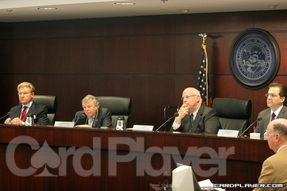






California a Likely Loner for Online PokerState Has No Plans to Partner with Nevada |
|
|
 California will probably go stag to the online poker dance.
California will probably go stag to the online poker dance.
With 37.7 million people, which is about the same as Canada, the state is the sexiest partner an intrastate industry could find. However, she has no plans, at least for now, to share her player pool with another jurisdiction.
“We’re not going to partner with Nevada, not today,” a source close to California’s online poker legislation said. “Nobody from Nevada has approached us, and we haven’t approached them.”
Nevada is on the verge of licensing companies to run poker games to residents and visitors. However, with a population of 2.7 million and 4 million visitors per month, according to data from the Nevada Resorts Association, the Silver State wants help.
Peter Bernhard, chairman of the Nevada Gaming Commission, said at last month’s iGaming North America Conference that it’s crucial for Nevada to have partnerships with other states.
“Let’s see if [the industry] works in a less liquid environment,” he said, referring to Nevada’s entry being intrastate at first.
In the absence of a federal bill legalizing the activity nationwide, some Nevada casino licensees are ready for intrastate even though it might not make the most business sense.
At least one potential online poker operator is eying California. Rick Kulis, vice president of Internet gaming for South Point Hotel and Casino, told Card Player that Nevada would love to have California “come on board.”
 While Nevada is going as fast as its regulatory process allows, some lawmakers in California are still battling for legalization. The state has the largest tribal casino industry in the country and finding common ground on a bill has, so far, been a nightmare.
While Nevada is going as fast as its regulatory process allows, some lawmakers in California are still battling for legalization. The state has the largest tribal casino industry in the country and finding common ground on a bill has, so far, been a nightmare.
Lawmakers have delayed trying to decide if a revenue-sharing compact with Nevada would benefit California. The state is contemplating a $30 million licensing fee for operators.
The California Tribal Business Alliance, a major opponent to a proposal currently on the table, is concerned about a de facto state partnership.
“The legislation as described would also let out-of-state interests come in to essentially extract revenue from California with no real constraints other than that they ‘partner’ with a legal entity,” Leslie Lohse, chairwoman of the CTBA, said in a February press release.
The vitriol between the tribal and commercial casino industries has also emerged in the U.S. Senate.
Gaming attorneys have said that the Department of Justice opinion in December 2011 makes the interstate pooling of players possible. The clarification of the Wire Act didn’t have much of an impact on California lawmakers, who have been considering online poker for years, according to the source close to the bill.
 The DOJ’s move was in stark contrast to abysmal progress on Capitol Hill. California actually has a law on the books that allows opting out of a potential federal framework.
The DOJ’s move was in stark contrast to abysmal progress on Capitol Hill. California actually has a law on the books that allows opting out of a potential federal framework.
Utah made a similar move, although its legislation preemptively bans and criminalizes web poker.
If California does legalize, the state could use Nevada for one thing: its regulations. Gaming officials in Sacramento could borrow from the language crafted in the Silver State, according to the source.
Follow Brian Pempus on Twitter — @brianpempus
